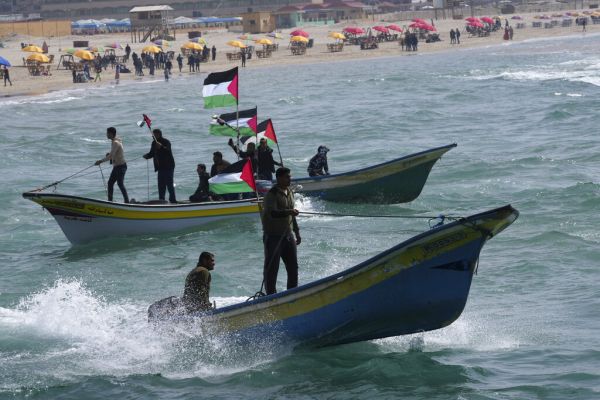Hamas’s Gaza chief Yahye Sinwar recently said the terror group was working with unspecified partners to break the blockade.
By Pesach Benson, United With Israel
Palestinian factions in Gaza are gearing up to break Israel’s naval blockade of the Strip, according to a Palestinian media report.
Al-Quds, a Palestinian daily based in Jerusalem, reported that the activities would be modeled on the “March of Return,” a series of violent Palestinian demonstrations along the Israel-Gaza border which were held every Friday over a 19-month period in 2018-2019.
The report did not elaborate on when this campaign would begin or the tactics behind it.
In a high-profile, provocative speech at the end of April, Hamas’s Gaza chief, Yahye Sinwar mentioned that the terror organization was working with other parties to break Israel and Egypt’s maritime blockade of Gaza.
Sinwar didn’t identify who Hamas is working with, but it’s believed he was referring to Iran.
The Israel-Egypt blockade was put in place in 2007 to prevent weapons smuggling after Hamas violently seized control of the Strip. Since then, the Navy has foiled numerous smuggling attempts, most recently in April.
The Israeli Navy interdicts ships trying to enter Gaza waters while Palestinian boats based in the Strip are restricted from sailing 10-15 nautical miles off the shore depending on the security situation.
Items entering Gaza are routed over land through the Kerem Shalom border crossing. The Rafah border crossing between Egypt and Gaza is not equipped to handle large scale deliveries, and Cairo often closes it for extended periods of time.
Between 2009-2018, Palestinian supporters launched a number of flotillas hoping to break the Israeli maritime blockade.
The most notorious of them was the 2010 Freedom Flotilla, of which the largest ship was the Mavi Marmara. Ten Turkish Islamists were killed in a melee with Israeli commandos who intercepted the ship. Although flotilla organizers claimed to be delivering humanitarian aid to the Strip, no such supplies were found aboard the Mavi Marmara.
An independent UN inquiry into the affair affair (the Palmer Report of 2011) criticized Israeli forces for using excessive force but upheld the blockade’s legality.
